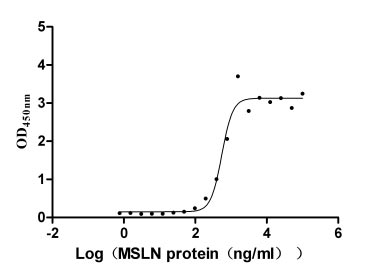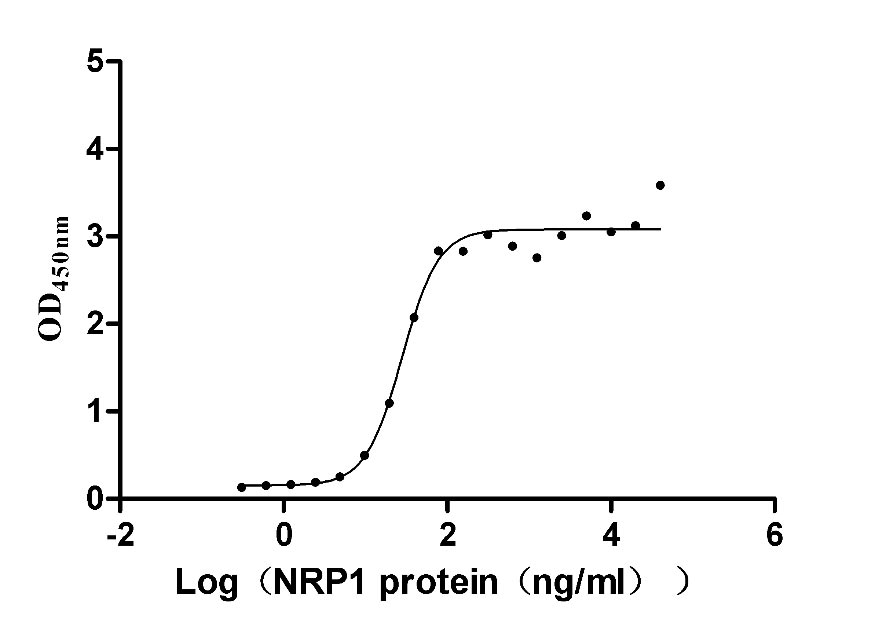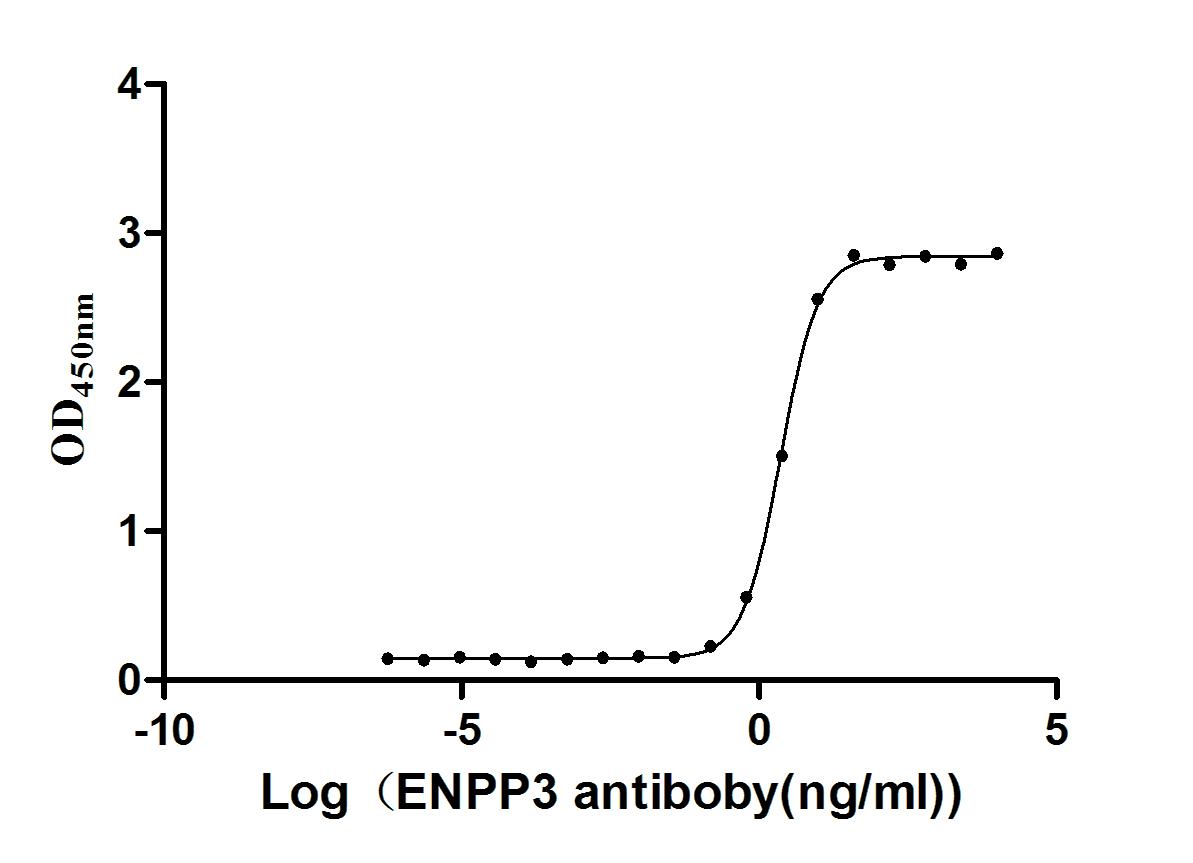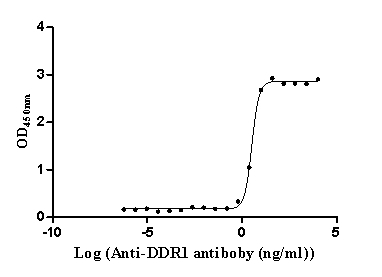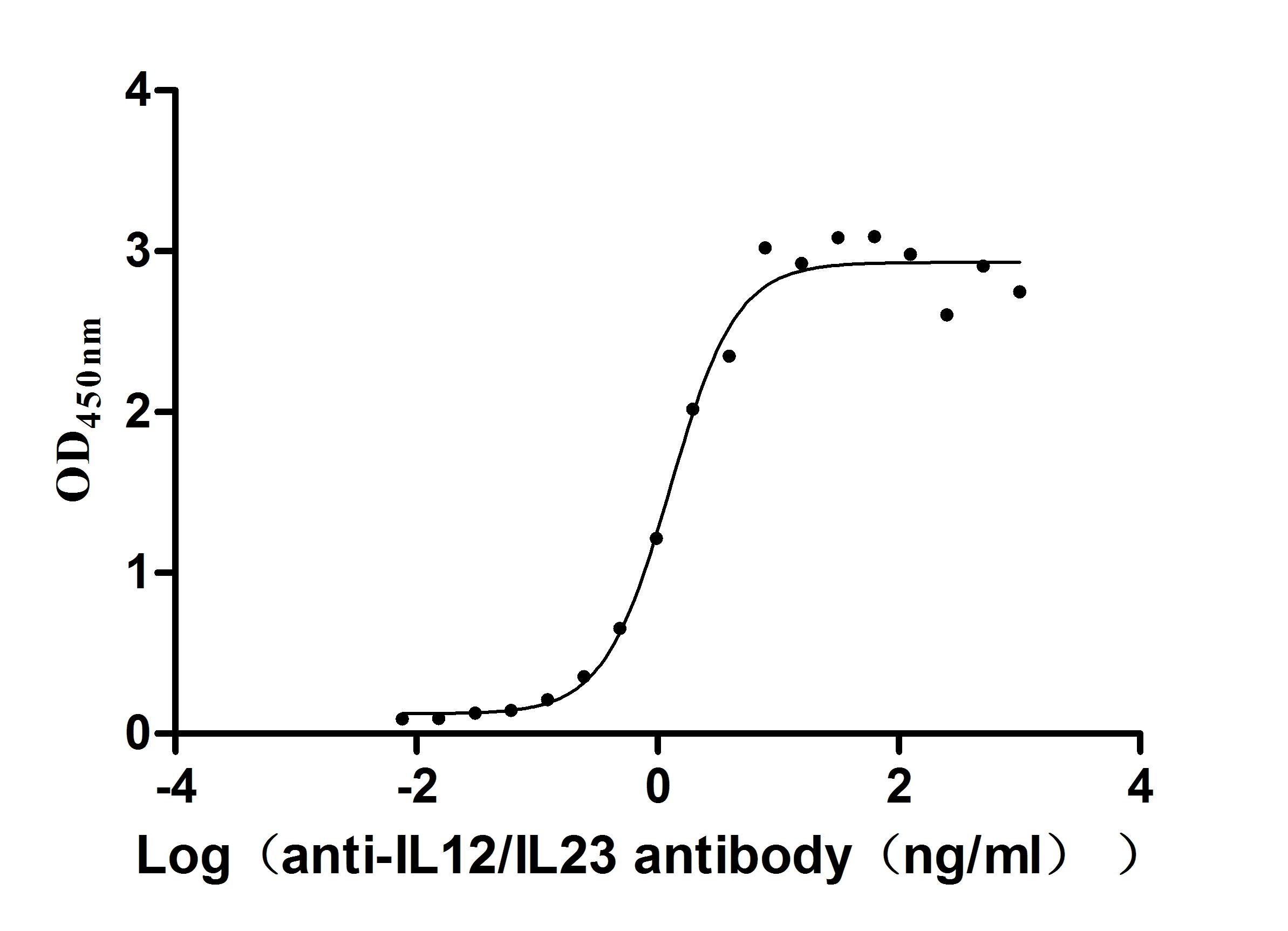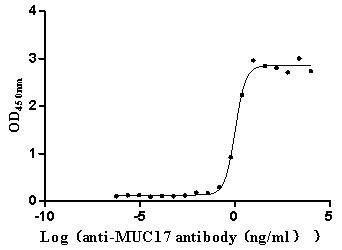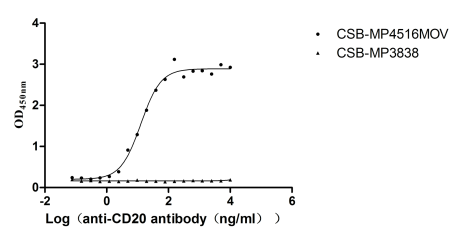Recombinant Human Cyclic AMP-dependent transcription factor ATF-3 (ATF3)
-
货号:CSB-YP002271HU
-
规格:
-
来源:Yeast
-
其他:
-
货号:CSB-EP002271HU-B
-
规格:
-
来源:E.coli
-
共轭:Avi-tag Biotinylated
E. coli biotin ligase (BirA) is highly specific in covalently attaching biotin to the 15 amino acid AviTag peptide. This recombinant protein was biotinylated in vivo by AviTag-BirA technology, which method is BriA catalyzes amide linkage between the biotin and the specific lysine of the AviTag.
-
其他:
-
货号:CSB-BP002271HU
-
规格:
-
来源:Baculovirus
-
其他:
-
货号:CSB-MP002271HU
-
规格:
-
来源:Mammalian cell
-
其他:
产品详情
-
纯度:>85% (SDS-PAGE)
-
基因名:
-
Uniprot No.:
-
别名:Activating transcription factor 3; ATF3; ATF3_HUMAN; ATF3deltaZip2; ATF3deltaZip2c; ATF3deltaZip3; cAMP dependent transcription factor ATF3; cAMP-dependent transcription factor ATF-3; Cyclic AMP dependent transcription factor ATF3; Cyclic AMP-dependent transcription factor ATF-3
-
种属:Homo sapiens (Human)
-
蛋白长度:Full length protein
-
表达区域:1-181
-
氨基酸序列MMLQHPGQVS ASEVSASAIV PCLSPPGSLV FEDFANLTPF VKEELRFAIQ NKHLCHRMSS ALESVTVSDR PLGVSITKAE VAPEEDERKK RRRERNKIAA AKCRNKKKEK TECLQKESEK LESVNAELKA QIEELKNEKQ HLIYMLNLHR PTCIVRAQNG RTPEDERNLF IQQIKEGTLQ S
-
蛋白标签:Tag type will be determined during the manufacturing process.
The tag type will be determined during production process. If you have specified tag type, please tell us and we will develop the specified tag preferentially. -
产品提供形式:Lyophilized powder
Note: We will preferentially ship the format that we have in stock, however, if you have any special requirement for the format, please remark your requirement when placing the order, we will prepare according to your demand. -
复溶:We recommend that this vial be briefly centrifuged prior to opening to bring the contents to the bottom. Please reconstitute protein in deionized sterile water to a concentration of 0.1-1.0 mg/mL.We recommend to add 5-50% of glycerol (final concentration) and aliquot for long-term storage at -20℃/-80℃. Our default final concentration of glycerol is 50%. Customers could use it as reference.
-
储存条件:Store at -20°C/-80°C upon receipt, aliquoting is necessary for mutiple use. Avoid repeated freeze-thaw cycles.
-
保质期:The shelf life is related to many factors, storage state, buffer ingredients, storage temperature and the stability of the protein itself.
Generally, the shelf life of liquid form is 6 months at -20°C/-80°C. The shelf life of lyophilized form is 12 months at -20°C/-80°C. -
货期:Delivery time may differ from different purchasing way or location, please kindly consult your local distributors for specific delivery time.Note: All of our proteins are default shipped with normal blue ice packs, if you request to ship with dry ice, please communicate with us in advance and extra fees will be charged.
-
注意事项:Repeated freezing and thawing is not recommended. Store working aliquots at 4°C for up to one week.
-
Datasheet :Please contact us to get it.
相关产品
靶点详情
-
功能:This protein binds the cAMP response element (CRE) (consensus: 5'-GTGACGTActivates transcription presumably by sequestering inhibitory cofactors away from the promoters.
-
基因功能参考文献:
- Therefore, though ATF3 is activated downstream of the Wnt/beta-catenin pathway, it acts as a negative regulator of the migration and invasion of HCT116 human colon cancer cells exhibiting aberrant Wnt/beta-catenin activity. ATF3 is a candidate biomarker and target for human colorectal cancer treatment and prevention. PMID: 29966001
- Luciferase reporter assay identified a direct interaction of 3' UTRs of ATF3 and Runx2 with miR-590-3p in these cells. Overexpression of miR-590-3p also decreased proliferation and increased apoptosis of breast cancer cells. PMID: 30076901
- ATF3 mediates the inhibitory action of TNF-alpha on osteoblast differentiation and that the TNF-alpha-activated JNK pathway is responsible for the induction of Atf3 expression. PMID: 29605296
- these data indicated that ATF3 might promote intestinal epithelial cell apoptosis in Crohn's disease via up-regulating the stability and transcription activity of p53 PMID: 29716766
- electrophilic properties of itaconate and derivatives regulate the IkappaBzeta-ATF3 inflammatory axis; results demonstrate that targeting the DI-IkappaBzeta regulatory axis could be an important new strategy for the treatment of IL-17-IkappaBzeta-mediated autoimmune diseases PMID: 29670287
- High ATF3 expression is associated with breast cancer. PMID: 29534690
- ATF3 and EGR1 are involved in the beginning of inflammatory processes. Whether these two transcription factors act as tumour suppressors or promoters is context dependent and warrants analysis in further studies PMID: 28803237
- ATF3 and PRAP1 play important roles in cisplatin-induced DNA damage repair process. PMID: 29886035
- Data show that amino acid limitation (amino acid response, AAR) activation of activating transcription factor 3 (ATF3) transcription is transient relative to activation by the unfolded protein response (UPR). PMID: 29413899
- In patients with NAFLD and/or T2D, a significant positive correlation was observed between hepatic ATF3 expression and surrogate markers of T2D, mitochondrial dysfunction, and macrophage infiltration. PMID: 28365312
- our results suggest that ATF3 promotes the invasion and proliferation of CRC cells, at least in part, via the regulation of CEACAM1-mediated EMT. PMID: 28402947
- ATF3 is involved in promoting particulate matter-induced pulmonary inflammation. PMID: 29378244
- Negative pressure wound therapy exerts an anti-inflammatory effect, possibly through the suppression of proinflammatory enzymes and cytokines resulting from Ik B-alpha inhibition and ATF-3 activation, which may prevent the activation of the NF-kappaB pathway in human diabetic foot wounds. PMID: 27883358
- ATF3 plays a significant role in regulating human endometrial receptivity and embryo attachment in vitro via up-regulation of leukemia inhibitory factor. PMID: 28577574
- Upregulation of ATF3 in lung cancer promotes cell proliferation, migration, and invasion, and may represent a novel therapeutic target for lung cancer PMID: 28239957
- ATF3 is a negative regulator of inflammation in human fetal membranes; in primary amnion cells, ATF3 expression is induced by IL-1beta and fsl-1, and ATF3 silencing further exacerbates the inflammatory response when stimulated with these factors. Subsequently, ATF3 expression is decreased in fetal membranes after term labour and with preterm chorioamnionitis, conditions closely associated with inflammation and infection. PMID: 27780541
- Altering TR4-ATF3 signaling increases the efficacy of cisplatin to suppress hepatocellular carcinoma growth/progression. PMID: 27050071
- ATF3 may be a potential early diagnostic biomarker for silicosis and ATF3 acts as a repressor in inflammatory responses induced by silica PMID: 29102675
- The analysis showed higher urinary NGAL and urinary ATF3 in patients with sepsis-AKI in comparison with patients with sepsis-non-AKI and healthy volunteers. PMID: 28061889
- ATF3 mRNA and protein expression was significantly reduced in preterm Preeclamptic placentas. Therefore, reduced ATF3 may be centrally involved in the pathology of Preeclampsia. PMID: 28947613
- Data suggest that suppression of nonsense-mediated RNA decay due to persistent DNA damage (from exposure to either mutagens, gamma rays, or oxidative stress) requires the activity of p38alpha MAPK (MAPK14, mitogen-activated protein kinase 14, MAP kinase p38 alpha); mRNA of ATF3 (activating transcription factor 3) is stabilized by persistent DNA damage in a p38alpha MAPK-dependent manner. PMID: 28765281
- The microvascular injury phenotypes observed in vitro and in vivo were similar. ATF3 plays an important role in mediating brain microvascular responses to acute and chronic lipotoxic injury and may be an important preventative and therapeutic target for endothelial dysfunction in vascular cognitive impairment . PMID: 27087439
- we have identified ATF3 as an important regulator of cisplatin cytotoxicity and that ATF3 inducers in combination with platins are a potential novel therapeutic approach for NSCLC. PMID: 27659012
- reactivation of ATF3 is an important factor in determining sensitivity to pracinostat treatment, both in vitro and in vivo, and could serve as a potential biomarker of response and provide a rationale for therapeutic utility in HDACi-mediated treatments for bladder cancer. PMID: 27196751
- these findings support roles for both cFOS (indirect) and ATF3 (direct) in effecting MMP13 transcription in human chondrocytes. PMID: 27956552
- We functionally validated several elements for metformin-induced promoter and enhancer activity. These include an enhancer in an ataxia telangiectasia mutated (ATM) intron that has SNPs in linkage disequilibrium .Using ChIP-seq and siRNA knockdown, we further show that activating transcription factor 3 (ATF3), our top metformin upregulated AMPK-dependent gene, could have an important role in gluconeogenesis repression. PMID: 27902686
- ATF3 inhibition significantly increased the expression of proinflammatory cytokines interleukin 6 and interleukin 8 in cigarette smoke extract stimulated human bronchial epithelial cells. PMID: 28185985
- ATF3 overexpression increased PFF-A-mediated cleaved PARP. PMID: 27043582
- Ang II-induced upregulation of ATF3 and SUMO1 in vitro and in vivo was blocked by Ang II type I receptor antagonist olmesartan. Moreover, Ang II induced ATF3 SUMOylation at lysine 42, which is SUMO1 dependent. PMID: 26850942
- As a result, ATF3 rather protected the p53 wild-type cells from UV-induced apoptosis. Our results thus indicate that ATF3 regulates cell fates upon UV irradiation in a p53-dependent manner. PMID: 26994140
- CARMA1- and MyD88-dependent activation of Jun/ATF-type AP-1 complexes is a hallmark of ABC diffuse large B-cell lymphomas. PMID: 26747248
- Activating transcription factor 3 represses inflammatory responses by binding to the p65 subunit of NF-kappaB PMID: 26412238
- TGRL lipolysis products induce stress protein ATF3 via the TGF-beta receptor pathway, resulting in induction of apoptosis in aortic endothelial cells PMID: 26709509
- ATF3 regulates canonical TGFbeta and Smad signaling and fibroblast activation in systemic sclerosis. PMID: 25589515
- ATF3 overexpression leads to an increase of collective cell invasion phenotype in Colorectal Cancer. PMID: 26851004
- Data suggest that after the expression of activating transcription factor 3 (ATF3) and microRNA miR-30c-2-3p elicited by lysophosphatidic acid, miR-30c-2-3p negatively regulates the expression of ATF3 through post-transcriptional silencing. PMID: 26418018
- Taken together, these results suggest that ATF3 promotes the progression of human gliomas PMID: 25872784
- DNA damage-triggered ATF3 controlled p53 accumulation and generation of double-strand breaks may serve as a switch between DNA damage and cell death following TOP2A inhibitor treatment. PMID: 25521189
- The stress-responsive gene ATF3 regulates the histone acetyltransferase Tip60 stability by promoting USP7-mediated deubiquitination of Tip60. PMID: 25865756
- ATF3 is inactive in healthy hepatic cells and activated following hepatitis C virus infection. PMID: 25816118
- The function of ATF3 is to block the reactivation of virus induced by neuronal stress. PMID: 26305977
- It compared the induction of ATF3 protein as measured by Western blot analysis with single-molecule localization microscopy dSTORM to quantify the dynamics of accumulation of intranuclear ATF3 of triglyceride-rich (TGRL) lipolysis product-treated HAEC. PMID: 25189785
- SUMO modification of ATF3 influences CCND1/2 activity and cellular proliferation of prostate cancer PC3 and DU145 cells and explains at least in part how ATF3 functions to regulate cancer development. PMID: 23591848
- Tissue array analysis suggests role for ATF3 in regulating the occurrence of glioma and disease progression. PMID: 26051724
- Human CHAC1 Protein Degrades Glutathione, and mRNA Induction Is Regulated by the Transcription Factors ATF4 and ATF3 and a Bipartite ATF/CRE Regulatory Element. PMID: 25931127
- these results suggest that there is a negative feedback expression of pre-mir-590 and its putative target gene, ATF-3 in human breast cancer cells. PMID: 25150595
- ATF3 is a downstream target of SRC and CaMKII signaling, and may be involved in adrenocortical aldosterone synthesis. PMID: 25400120
- Urotensin-II induces activating transcription factor 3 (ATF3) at both mRNA and protein levels. PMID: 25268131
- Suggest critical role for tumor suppressor ATF3 in esophageal squamous cell carcinoma progression. PMID: 25149542
- ATF-3 was associated with Runx2 promoter in MDA-MB231 cells. PMID: 25380580
显示更多
收起更多
-
亚细胞定位:Nucleus.
-
蛋白家族:BZIP family, ATF subfamily
-
数据库链接:
HGNC: 785
OMIM: 603148
KEGG: hsa:467
STRING: 9606.ENSP00000344352
UniGene: Hs.460
Most popular with customers
-
Recombinant Human Mucin-16 (MUC16), partial (Active)
Express system: Mammalian cell
Species: Homo sapiens (Human)
-
Recombinant Human Neuropilin-1 (NRP1) (Active)
Express system: Mammalian cell
Species: Homo sapiens (Human)
-
Express system: Mammalian cell
Species: Homo sapiens (Human)
-
Recombinant Human Zymogen granule protein 16 homolog B (ZG16B) (Active)
Express system: Mammalian cell
Species: Homo sapiens (Human)
-
Recombinant Human Epithelial discoidin domain-containing receptor 1 (DDR1), partial (Active)
Express system: Mammalian cell
Species: Homo sapiens (Human)
-
Recombinant Human IL12B&IL12A Heterodimer Protein (Active)
Express system: Mammalian cell
Species: Homo sapiens (Human)
-
Recombinant Human Mucin-17 (MUC17), partial (Active)
Express system: Mammalian cell
Species: Homo sapiens (Human)
-
Recombinant Macaca fascicularis Membrane spanning 4-domains A1 (MS4A1)-VLPs (Active)
Express system: Mammalian cell
Species: Macaca fascicularis (Crab-eating macaque) (Cynomolgus monkey)


